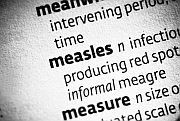
TUESDAY, Feb. 24, 2015 (HealthDay News) — In a sign that the measles outbreak that began at two Disneyland theme parks in California last December may be easing, California health officials reported Monday no new cases since their last update on Friday.
The total number of measles cases in California now stands at 123, state health officials said. The bulk of the cases in which vaccine status could be confirmed have been in people who weren’t vaccinated against measles, the officials said.
Although this was the first time there were no new cases between state updates, California officials told the Associated Press that the outbreak can’t be declared over until two incubation periods have passed. The incubation period for measles runs from four days before to four days after the appearance of the telltale rash of the highly contagious viral disease, according to the U.S. Centers for Disease Control and Prevention.
On Monday, U.S. health officials reported that the number of people nationwide infected with measles had increased slightly to 154 patients in 17 states and the District of Columbia.
Last week, the number of cases was 141, CDC officials said.
The outbreak began at two Disney theme parks in southern California in December, according to the CDC, and it’s believed that the source of the infection was likely a foreign visitor or a U.S. resident returning from abroad.
Measles is still common in many parts of the world, including some countries in Europe, Asia, the Pacific and Africa, the CDC said.
The majority of people who’ve gotten measles in the current outbreak were unvaccinated, the agency said.
The CDC said that, as of Feb. 20, the overwhelming majority of cases have been reported in California, with 104 cases. Other states reporting cases include Arizona, 7 cases; Colorado, 1 case; District of Columbia, 2 cases; Delaware, 1 case; Georgia, 1 case; Illinois, 14 cases; Michigan, 1 case; Minnesota, 1 case; Nebraska, 2 cases; New Jersey, 1 case; New York, 2 cases; Nevada, 6 cases; Pennsylvania, 1 case; South Dakota, 2 cases; Texas, 1 case; Utah, 2 cases; and Washington, 5 cases.
Most of the cases — 118 cases, or 77 percent — have been linked to the outbreak that started at the Disney parks in California, officials said.
The United States declared measles eliminated in 2000, meaning the virus was no longer native to this country. However, the nation experienced a record number of measles cases in 2014, with 644 cases in 27 states. This was the greatest number of cases since measles elimination was documented in 2000.
Since 2000, annual reported cases of the disease have ranged from a low of 37 in 2004 to the high of 644 in 2014, the CDC said.
Public health officials have said the current outbreak has been fueled, in large part, by parents who are reluctant to have their children vaccinated against measles. Parents whose children aren’t vaccinated should get them immunized, and adults who aren’t sure about their vaccination history should get a booster dose as well, according to the CDC.
Many parents aren’t getting their children vaccinated against measles, due largely to what experts call mistaken fears about childhood vaccines.
A big contributing factor to parents’ concerns about vaccine safety was a 1998 paper published and later retracted in the medical journal The Lancet. The study falsely suggested a link between the measles-mumps-rubella (MMR) vaccine and autism. The lead author of that paper has since lost his medical license for having falsified his data.
Several dozen studies and a report from the Institute of Medicine have since found no link between autism and any vaccines, including the MMR vaccine.
The American Academy of Pediatrics, the American Academy of Family Physicians and the CDC all recommend that children receive the MMR vaccine at age 12 to 15 months, and again at 4 to 6 years.
The most common side effects of the MMR vaccine are a fever and occasionally a mild rash. Some children may experience seizures from the fever, but experts say these seizures have no long-term negative effects.
According to the CDC, serious complications from measles can include pneumonia and encephalitis, which can lead to long-term deafness or brain damage. About two or three in every 1,000 cases of measles in children results in death, the agency said.
More information
Visit the U.S. Centers for Disease Control and Prevention for more on measles.
Copyright © 2026 HealthDay. All rights reserved.

